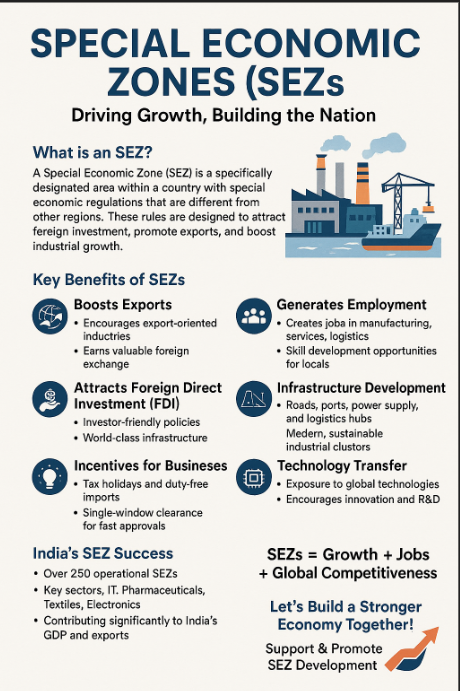India’s First AI SEZ in Raipur
India is set to establish its first Artificial Intelligence Special Economic Zone (AI SEZ) in Nava Raipur, Chhattisgarh. The project will be constructed by RackBank Datacenters Pvt. Ltd., and will involve an investment of ₹1,000 crore. It will position India as a global AI hub.
What is a Special Economic Zone (SEZ)?
A Special Economic Zone (SEZ) is a designated area that operates under different economic regulations than the rest of the nation. SEZs are designed to boost trade, attract investment, and promote industrial growth by offering special benefits .
Benefits of Doing Business in an SEZ
Companies operating within SEZs enjoy several benefits those include:
- Tax Benefits: income tax exemptions, customs duty waivers, and GST benefits, reducing operational costs.
- Ease of Doing Business: SEZs offer single-window clearance for approvals, making it easier for companies to establish and run their business.
- Infrastructure Support: SEZs provide state-of-the-art facilities, including reliable power supply, transportation networks, and communication systems.
- Export Incentives: SEZs focus on export-driven growth, allowing companies to access global markets with competitive advantages.
- Employment Generation: SEZs create job opportunities for skilled professionals, boosting local economies and reducing migration to metropolitan cities.

AI SEZ in Raipur : Key Features
- Location: Nava Raipur, Chhattisgarh
- Investment: ₹1,000 crore
- Developer: RackBank Datacenters Pvt. Ltd.
- Size: 6 acres
- Infrastructure: A 1.5 lakh square foot facility equipped with advanced AI servers and systems
- Data Centers: Four high-density data centers with a combined capacity of 80 megawatts, supporting digital infrastructure across multiple states.
Special Economic Zones (SEZs) in India:
- SEZ Act, 2005: Establishes the legal framework for SEZs in India.
The Department of Commerce, under the Ministry of Commerce & Industry, is responsible for handling Special Economic Zones (SEZs) in India.
Number of SEZs: As of 2025, India has 375 notified SEZs, with 270 operational across various states.
- State with the Highest SEZs: Tamil Nadu leads with the highest number of SEZs, primarily in IT and manufacturing.
- SEZ Contribution to Exports: SEZs account for nearly 30% of India’s total exports, spanning industries like IT, pharmaceuticals, and textiles.
- SEZ Amendment Bill (2024): Revamps SEZ policies, replacing the previously proposed DESH Bill for greater flexibility in trade and investment.
- RoDTEP Benefits for SEZs: Effective June 1, 2025, SEZ exports regain Remission of Duties and Taxes on Exported Products (RoDTEP) benefits.
FAQ: Special Economic Zones (SEZs) in India
1. What is a Special Economic Zone (SEZ)?
A Special Economic Zone (SEZ) is a specifically demarcated area within a country that offers special economic regulations, tax incentives, and infrastructure to promote foreign investment, exports, and manufacturing.
2. Who can set up an SEZ in India?
Any private or public sector company, State Government, or foreign investor can propose an SEZ, subject to approval from the Government of India.
3. What are the benefits of setting up or operating in an SEZ?
Tax exemptions (Income Tax, Customs, and GST for specific periods)
Single-window clearance for approvals
World-class infrastructure
Duty-free imports for development and operations
100% FDI allowed through automatic route in most sectors
4. How many SEZs are currently operational in India?
As of 2024, there are over 270 operational SEZs in India, covering sectors like IT/ITES, manufacturing, pharmaceuticals, textiles, and engineering.
5. Are SEZs only for export-oriented businesses?
Yes, SEZ units are primarily meant for export-oriented operations. However, limited domestic sales are permitted, subject to duties and compliance with DTA (Domestic Tariff Area) rules.
6. What is the process to start a business unit in an SEZ?
Businesses must apply to the Development Commissioner of the respective SEZ with a proposal. After approval and signing of a Letter of Approval (LOA), they can begin operations.
7. Are SEZ units subject to labour laws?
Yes, SEZ units are required to comply with Indian labour laws. However, some procedures and inspections may be simplified or streamlined to promote ease of doing business.
8. What is the validity of the tax benefits in SEZs?
As per the SEZ Act, 2005, SEZ units were entitled to 100% Income Tax exemption on export income for the first 5 years, 50% for the next 5 years, and 50% of the ploughed back profits for another 5 years. However, these exemptions are subject to change by government policies.
9. Can foreign companies operate in SEZs?
Yes, foreign companies can operate in SEZs. 100% Foreign Direct Investment (FDI) is permitted in most sectors under the automatic route.
10. What is the difference between SEZ and DTA (Domestic Tariff Area)?
SEZs are considered foreign territory for trade and customs duties, while the DTA includes the rest of India. Goods entering the DTA from an SEZ are treated as imports and are subject to applicable duties.
Would you like this section added in a specific format (HTML, WordPress post, PDF), or do you want it translated into another language like Hindi?

